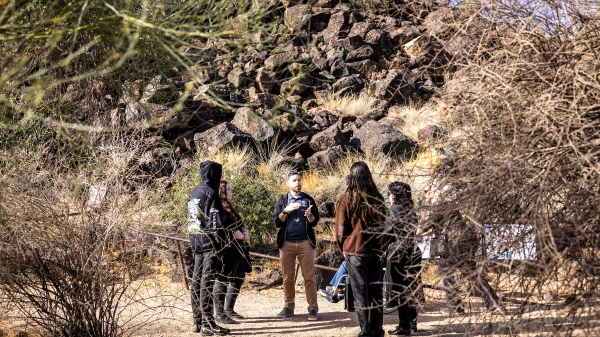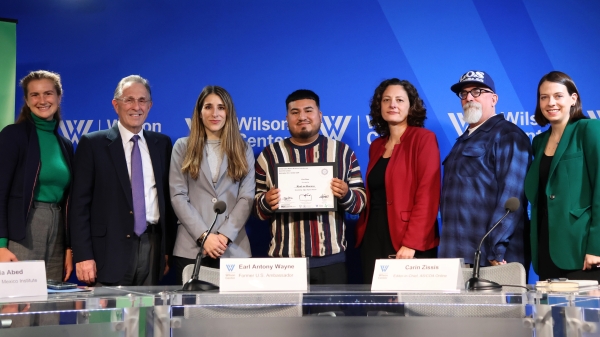The distance between the work of academia and the society that work is intended to improve is something scholars themselves often lament, but two publications from Arizona State University faculty demonstrate how language and literature in particular can have sometimes surprising connections to issues of contemporary importance.
In “Samson on the Yard: Teaching Milton’s 'Samson Agonistes' in an Arizona Prison,” Associate Professor Joe Lockard, an expert on prison studies, and Professor David Hawkes, an expert on John Milton, write about their own experiences teaching the work in Arizona prisons and how it and other such works, referred to as “prison literature,” can benefit incarcerated individuals while also providing fresh perspectives on the carceral system in general.
And in “Extending Applied Linguistics for Social Impact – Cross-Disciplinary Collaborations in Diverse Spaces of Public Inquiry,” Professor Doris Warriner and her co-editor, University of North Carolina at Charlotte Professor Elizabeth Miller, detail examples of and propose suggestions for how scholars of language might work together with non-language specialists to address pressing concerns and issues of our time.
‘Samson on the Yard’
Lockard is known at ASU for founding Prison Education Programming in 2009, and he continues to teach a weekly poetry workshop at Florence State Prison. Hawkes’ interests span a variety of fields ranging from Darwinism to zombies, but his specialty is the poetry of John Milton, whose work often dealt with the topic of incarceration.
Recognizing an opportunity to capitalize on shared interests, they combined forces to teach Milton’s “Samson Agonistes,” which recounts the biblical warrior’s imprisonment by the Philistines, to actual prisoners.
“It just struck me as an extremely interesting environment in which to teach that particular work, because it's full of reflections on the nature of prison life and the implications,” Hawkes said.
In their article for the Milton Quarterly, Hakwes and Lockard argue that after centuries of being overlooked, the work deserves its own place in the canon of prison literature, something both prisoners and society at large can benefit from.
“There is a tendency to believe that prison literature needs to be simple texts,” Lockard said. “That is wrong. (Prisoners) respond to complex and canonical texts. They have insights that are worthy of a graduate seminar.”
“I think it's important to always contextualize things historically, as well,” Hawkes added. “If you don't know how other societies and societies of the past have treated imprisonment, it's easy to make the mistake of assuming that the way we treat prisons is natural or the only right way to do it. So by reading works like ‘Samson Agonistes,’ we can get an idea of how these things have changed over time and learn from that.”
‘Extending Applied Linguistics for Social Impact’
In the introduction to their book, Warriner and Miller lay out their case for what it really means to apply applied linguistics and call on their colleagues in the field to put their money where their mouth is and leverage language to create a more equitable society in real, meaningful ways.
“The field has been moving more explicitly towards valuing work and scholarship that brings a critical perspective on the relationship between race, language and power,” Warriner said, “but this is recent and there has been some resistance. So there are two gaps (we’re trying to bridge): one is between what we have been doing and what we should be doing. The other is between the kinds of issues we are researching and writing about, and the kinds of impact we hope to have on the communities where that research is conducted.”
With Warriner’s mentorship, one of her graduate students recently completed research on health communication advocacy, one of many areas she and Miller argue could benefit from the input of applied linguists. But in their eyes, the potential to use the study of language to effect change is limitless.
“Language is how we make sense of the world and interact with the world, so it is omnipresent and always influential,” Warriner said. “Whether we are talking about race relations, workplace discrimination, housing discrimination, access to health care, gender/sexuality, global warming, the cultural wars or growing wealth disparities, the ways we use language can either contribute to the problem or help us identify and address the problem.”
Top image courtesy of Pixabay.com
More Arts, humanities and education

Petroglyph preserve celebrates 30th anniversary with ancient, modern tales
The Deer Valley Petroglyph Preserve provides a beautiful walk through a pristine desert where chuckwalla lizards are as plentiful as the cacti that comes in many shapes and sizes.It’s also a step…

Kaleidoscope short film contest inspires powerful binational filmmaking in its second year
“We come to this country not to steal anybody’s jobs but to take advantage of the opportunities that the rest ignore. We’ve been taking care of the American soil for many years. But our hands will…

ASU's Neal Lester reflects on life, death of poet Nikki Giovanni
When Neal Lester heard on Monday that poet and activist Nikki Giovanni had died, the news hit hard.Lester, the founding director of Arizona State University’s Project Humanities and a Foundation…
